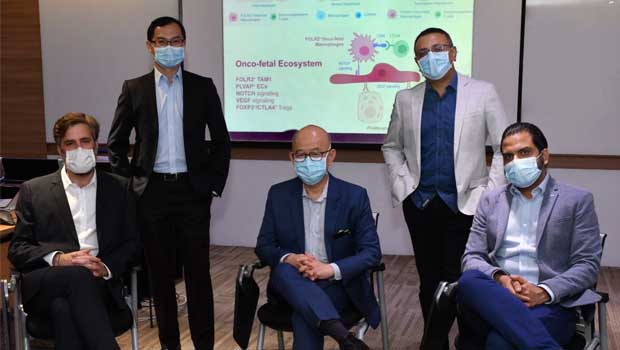
Breakthrough study by multi-disciplinary team spells potential for early diagnosis and treatment of liver cancer
Liver cancer (hepatocellular carcinoma, or HCC) is the sixth most common cancer worldwide, with four in five cases diagnosed in Asia. In Singapore, it is the fourth most common cancer among men. Every year, about 24 out of 100,000 people are diagnosed with liver cancer in Singapore.
Liver cancer is hard to detect in its early stages given the lack of distinctive signs and symptoms in most patients. Now, findings from a local study has opened up possibilities of new biomarkers to aid early detection and treatment.
Drawing parallels between fetal and cancer cell growth
One of the most interesting phenomenon in oncology is the observation that the blood cancer marker alfa-feto-protein is found both in pregnant women and in patients with HCC. In the complex ecosystem of diverse cell types, there were studies pointing to similarities between tumours and embryonic cell development. In human gestation, the fetus (which is essentially foreign to the body) is tolerated by the mother’s immune system until birth. It has long been suggested by liver specialists, that cancers and especially liver cancers, may have adopted similar mechanisms to avoid rejection by the body. What is unknown is how liver cancer cells undergo such reprogramming and how this interacts with the tumour micro-environment.
Professor Jerry Chan, Clinician-Scientist and Senior Consultant, Department of Reproductive Medicine, KK Women’s and Children’s Hospital, said, “Globally, cancer cases have risen rapidly over the years. Understanding the behaviour of how cancer cells reprogramme their environment to simulate a fetal environment, and thereby promoting their growth and avoiding immune destruction, may be key to developing a cure.”
In a recent study, Prof Chan teamed up with researchers and clinician-scientists from A*STAR’s Genome Institute of Singapore, Singapore Immunology Network, and the National Cancer Centre Singapore (NCCS) to study the reprogramming of the tumour ecosystem in HCC. Prof Chan’s knowledge of the fetal immune system’s behaviour derived from prior researches contributed to the success of the study.
The study, published in the scientific journal Cell in September 2020, mapped the timeline of more than 200,000 single cells in the human liver from fetal development to liver cancer. This study leveraged the platform established by the National Medical Research Council Translational and Clinical Research (TCR) Flagship Programme in Liver Cancer, and discovered two fetal-like cell types in the tumour ecosystem of liver cancer – the reappearance of fetal-like endothelial cells (cells responsible for blood supply), and fetal-like macrophages (cells of the immune system that are also associated with tissue stability) in liver cancer patients.
In normal fetal liver development, fetal endothelial and macrophages cells help in organ growth and protect the tissue against the body’s own immune system. A liver cancer cell mimics the process by reactivating the signalling pathways of the two cell types when it divides and grows. This protects it from the body’s immune system and allows the cancer to multiply aggressively. These findings provide unprecedented and fundamental insights into the processes that drive cancer development.
Joining hands to fight liver cancer
The team’s landmark discovery could potentially lead to new ways to identify patients in the very early stages of developing liver cancer. It may also provide new therapeutic strategies to re-activate the immune system to fight cancer growth.
Professor Pierce Chow, Clinician-Scientist and Liver Surgeon at NCCS and Principal Investigator of the study and TCR Programme in Liver Cancer shared, “This study provides mechanistic confirmation of what many liver cancer specialists have suspected – regression to a fetal state that allows HCC to grow aggressively. The findings potentially opens up new approaches in the prevention and treatment of HCC.”
Another significance of the study is the involvement of scientists and clinician-scientists across different specialties and institutions in Singapore, a showcase of what multi-disciplinary collaborative research can achieve.
Professor William Hwang, Medical Director at NCCS, said, “Indeed, the multi-institutional collaboration has allowed the team to leverage each other’s expertise, leading to the discovery of onco-fetal reprogramming in liver cancer. I’m glad we are one step closer to understanding and treating liver cancer.”













 Get it on Google Play
Get it on Google Play